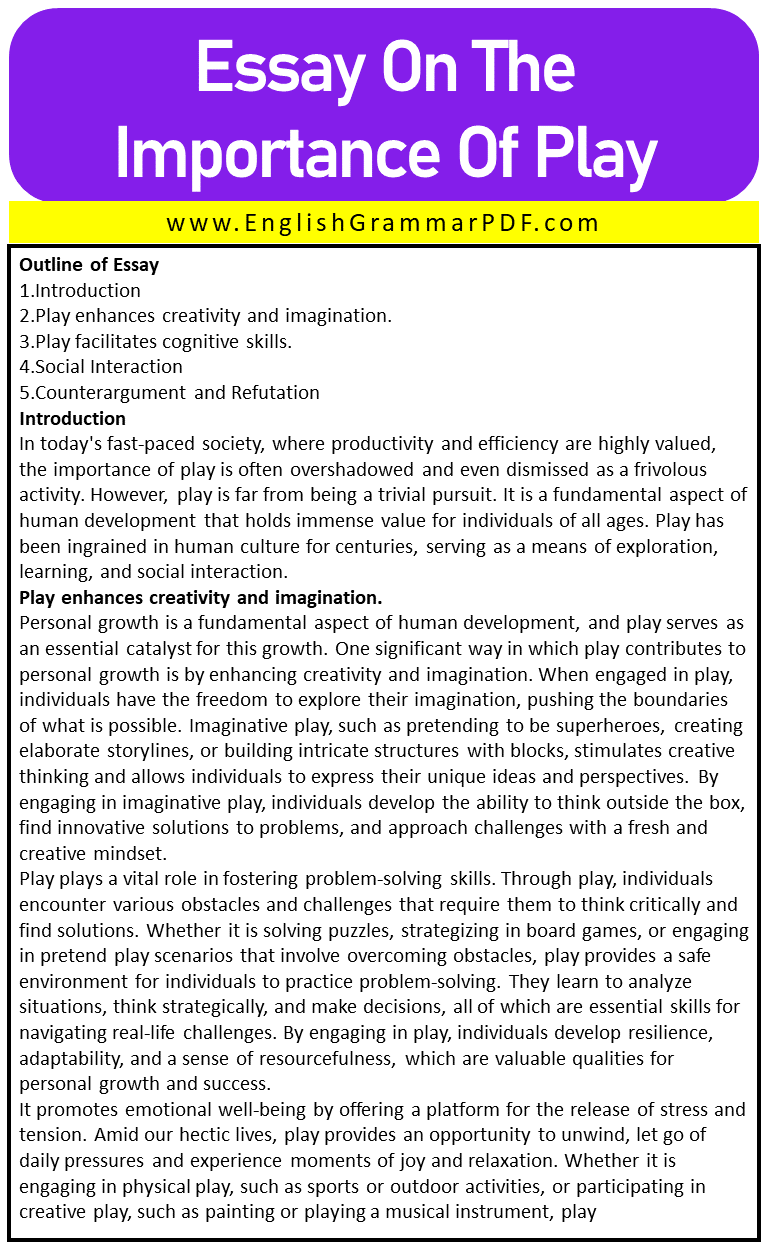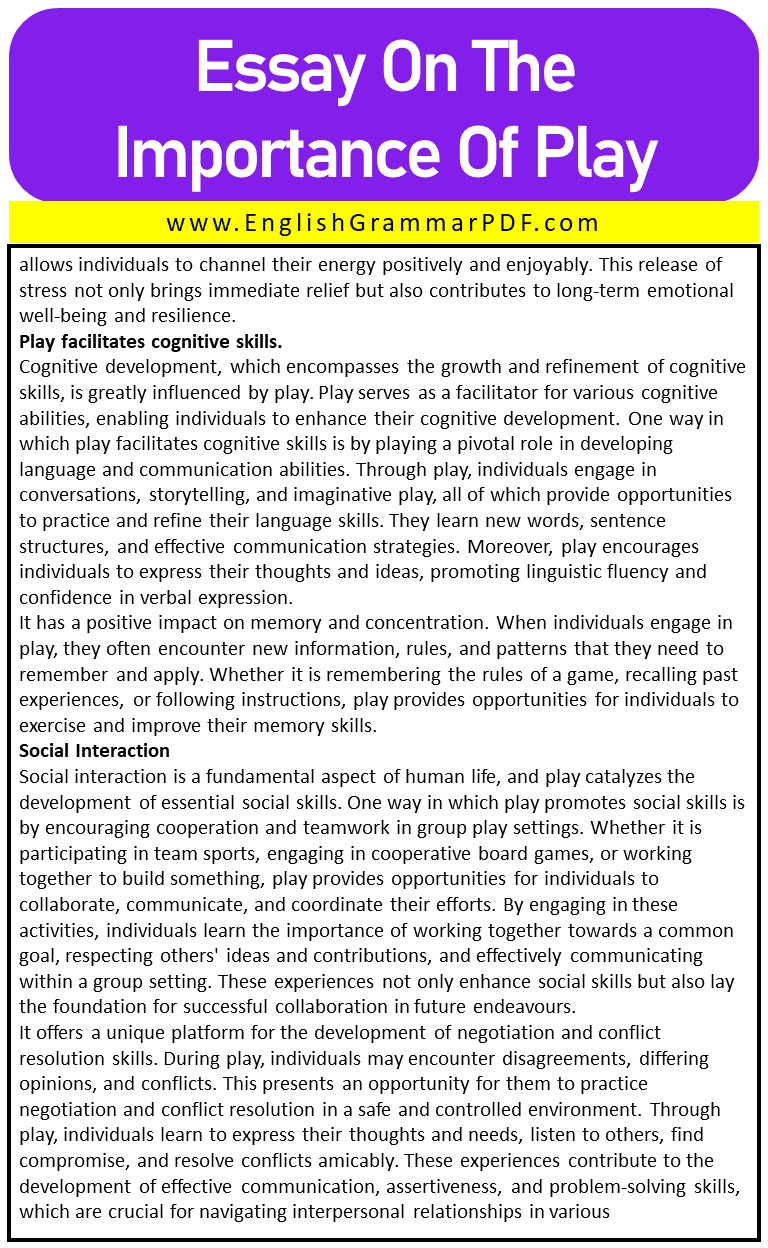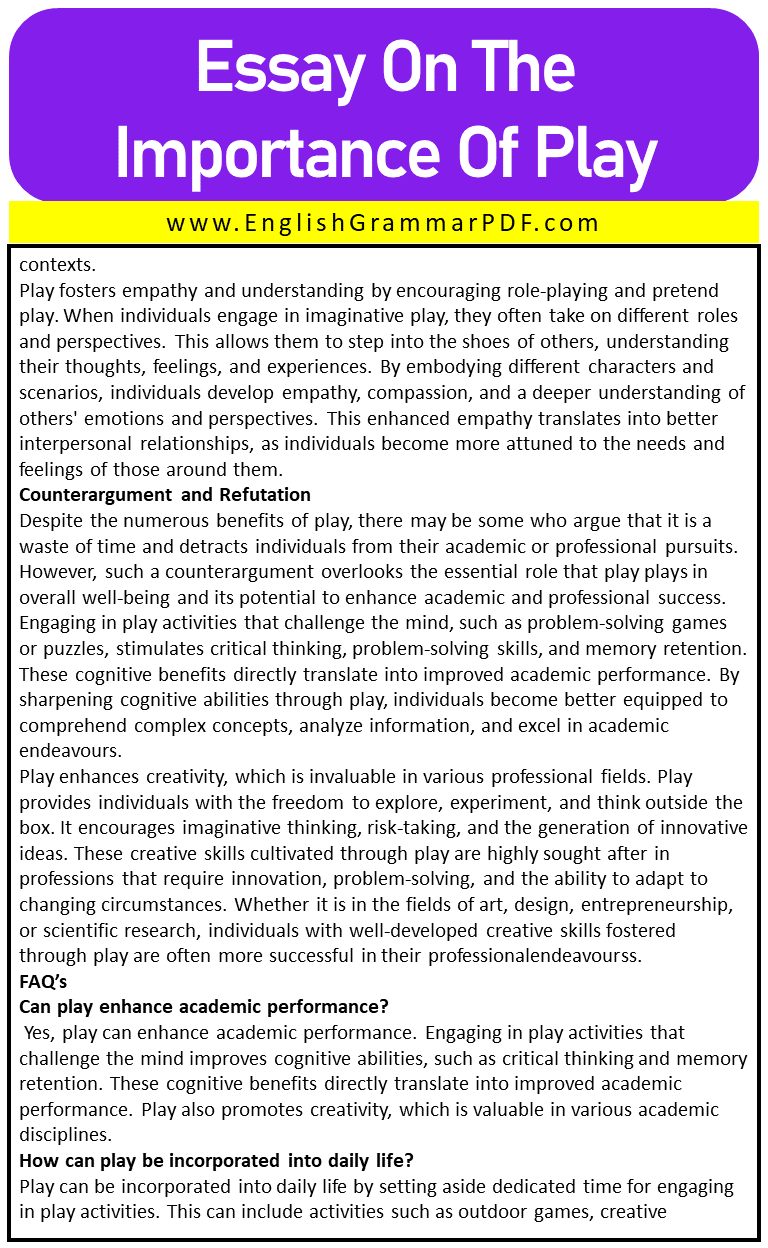Essay On The Importance Of Play
Outline of Essay
- Introduction
- Play enhances creativity and imagination.
- Play facilitates cognitive skills.
- Social Interaction
- Counterargument and Refutation
Introduction
In today’s fast-paced society, where productivity and efficiency are highly valued, the importance of play is often overshadowed and even dismissed as a frivolous activity. However, play is far from being a trivial pursuit. It is a fundamental aspect of human development that holds immense value for individuals of all ages. Play has been ingrained in human culture for centuries, serving as a means of exploration, learning, and social interaction.
Play enhances creativity and imagination.
Personal growth is a fundamental aspect of human development, and play serves as an essential catalyst for this growth. One significant way in which play contributes to personal growth is by enhancing creativity and imagination. When engaged in play, individuals have the freedom to explore their imagination, pushing the boundaries of what is possible. Imaginative play, such as pretending to be superheroes, creating elaborate storylines, or building intricate structures with blocks, stimulates creative thinking and allows individuals to express their unique ideas and perspectives. By engaging in imaginative play, individuals develop the ability to think outside the box, find innovative solutions to problems, and approach challenges with a fresh and creative mindset.
Play plays a vital role in fostering problem-solving skills. Through play, individuals encounter various obstacles and challenges that require them to think critically and find solutions. Whether it is solving puzzles, strategizing in board games, or engaging in pretend play scenarios that involve overcoming obstacles, play provides a safe environment for individuals to practice problem-solving. They learn to analyze situations, think strategically, and make decisions, all of which are essential skills for navigating real-life challenges. By engaging in play, individuals develop resilience, adaptability, and a sense of resourcefulness, which are valuable qualities for personal growth and success.
It promotes emotional well-being by offering a platform for the release of stress and tension. Amid our hectic lives, play provides an opportunity to unwind, let go of daily pressures and experience moments of joy and relaxation. Whether it is engaging in physical play, such as sports or outdoor activities, or participating in creative play, such as painting or playing a musical instrument, play allows individuals to channel their energy positively and enjoyably. This release of stress not only brings immediate relief but also contributes to long-term emotional well-being and resilience.
Play facilitates cognitive skills.
Cognitive development, which encompasses the growth and refinement of cognitive skills, is greatly influenced by play. Play serves as a facilitator for various cognitive abilities, enabling individuals to enhance their cognitive development. One way in which play facilitates cognitive skills is by playing a pivotal role in developing language and communication abilities. Through play, individuals engage in conversations, storytelling, and imaginative play, all of which provide opportunities to practice and refine their language skills. They learn new words, sentence structures, and effective communication strategies. Moreover, play encourages individuals to express their thoughts and ideas, promoting linguistic fluency and confidence in verbal expression.
It has a positive impact on memory and concentration. When individuals engage in play, they often encounter new information, rules, and patterns that they need to remember and apply. Whether it is remembering the rules of a game, recalling past experiences, or following instructions, play provides opportunities for individuals to exercise and improve their memory skills.
Social Interaction
Social interaction is a fundamental aspect of human life, and play catalyzes the development of essential social skills. One way in which play promotes social skills is by encouraging cooperation and teamwork in group play settings. Whether it is participating in team sports, engaging in cooperative board games, or working together to build something, play provides opportunities for individuals to collaborate, communicate, and coordinate their efforts. By engaging in these activities, individuals learn the importance of working together towards a common goal, respecting others’ ideas and contributions, and effectively communicating within a group setting. These experiences not only enhance social skills but also lay the foundation for successful collaboration in future endeavours.
It offers a unique platform for the development of negotiation and conflict resolution skills. During play, individuals may encounter disagreements, differing opinions, and conflicts. This presents an opportunity for them to practice negotiation and conflict resolution in a safe and controlled environment. Through play, individuals learn to express their thoughts and needs, listen to others, find compromise, and resolve conflicts amicably. These experiences contribute to the development of effective communication, assertiveness, and problem-solving skills, which are crucial for navigating interpersonal relationships in various contexts.
Play fosters empathy and understanding by encouraging role-playing and pretend play. When individuals engage in imaginative play, they often take on different roles and perspectives. This allows them to step into the shoes of others, understanding their thoughts, feelings, and experiences. By embodying different characters and scenarios, individuals develop empathy, compassion, and a deeper understanding of others’ emotions and perspectives. This enhanced empathy translates into better interpersonal relationships, as individuals become more attuned to the needs and feelings of those around them.
Counterargument and Refutation
Despite the numerous benefits of play, there may be some who argue that it is a waste of time and detracts individuals from their academic or professional pursuits. However, such a counterargument overlooks the essential role that play plays in overall well-being and its potential to enhance academic and professional success.
Engaging in play activities that challenge the mind, such as problem-solving games or puzzles, stimulates critical thinking, problem-solving skills, and memory retention. These cognitive benefits directly translate into improved academic performance. By sharpening cognitive abilities through play, individuals become better equipped to comprehend complex concepts, analyze information, and excel in academic endeavours.
Play enhances creativity, which is invaluable in various professional fields. Play provides individuals with the freedom to explore, experiment, and think outside the box. It encourages imaginative thinking, risk-taking, and the generation of innovative ideas. These creative skills cultivated through play are highly sought after in professions that require innovation, problem-solving, and the ability to adapt to changing circumstances. Whether it is in the fields of art, design, entrepreneurship, or scientific research, individuals with well-developed creative skills fostered through play are often more successful in their professionalendeavourss.
FAQ’s
Can play enhance academic performance?
Yes, play can enhance academic performance. Engaging in play activities that challenge the mind improves cognitive abilities, such as critical thinking and memory retention. These cognitive benefits directly translate into improved academic performance. Play also promotes creativity, which is valuable in various academic disciplines.
How can play be incorporated into daily life?
Play can be incorporated into daily life by setting aside dedicated time for engaging in play activities. This can include activities such as outdoor games, creative pursuits, sports, puzzles, board games, or social interactions. It is essential to prioritize play as a means of self-care and recognize its value in personal growth and overall well-being.
Can play be seen as a waste of time?
No, play should not be seen as a waste of time. While it may not produce tangible outcomes in the same way as academic or professional pursuits, play is crucial for overall well-being and personal growth. It provides opportunities for relaxation, self-expression, and enjoyment. Moreover, play enhances cognitive, emotional, and social development, which ultimately contributes to success in various areas of life.
Explore More Essays:
Essay On Operations Management
Download the PDF of the Essay:






